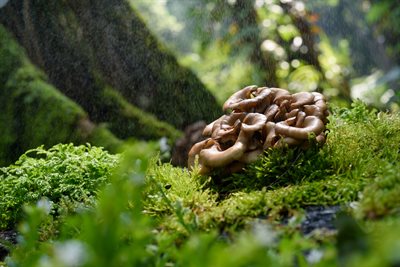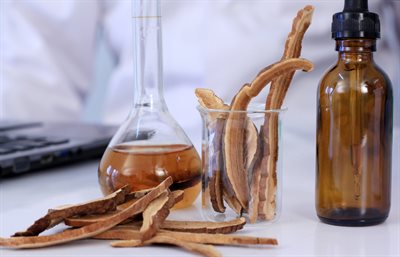Maitake mushrooms are edible polypore mushrooms with a distinct floral appearance. The Maitake is known by many names – the official title for the species is Grifola frondosa, but it is better known colloquially as “The Dancing Mushroom”. You may interpret this as meaning the mushroom has some form of energising effect, while it certainly does possess a number of beneficial qualities, this name actually comes from Japanese history and folklore. It is said that anyone who found this miraculous fungus would dance with joy thanks to the delicious flavour and health benefits of the maitake mushroom.
Though the precise aspects of Maitake mushroom extract may not have all been clear in the time of feudal Japan, they have become more apparent in recent years thanks to in-depth studies. Maitake has been observed to aid in the reduction of blood glucose levels, they are also believed to boost the human immune system, and some studies have even indicated that the mushrooms may possess anti-cancer properties. The main reason Maitake is believed to be such an important superfood is down to the occurrence of beta-glucans in the fungus.
Beta-glucans are sugars that are believed to help lower blood cholesterol by preventing the absorption of cholesterol-increasing substances in the stomach; an important factor for diets catered towards people who suffer from diabetes. Most edible fungi contain beta-glucans but Maitake are especially rich in them which is why they are so valuable; it also doesn’t hurt that they taste phenomenal.

Are Maitake Mushrooms The Same As Hen Of The Woods?
We may have mentioned a few of the varied and fascinating names that Maitake is known by but we have only scratched the surface when it comes to the many mantras of this famed mushroom. Outside of Japan, in the United States and across Europe, Maitake is also known as the “Hen of the Woods”. We’d like to say this is down to some mystical fairytale, folklore, or historical event that generates intrigue and an element of mystery behind this magnificent mushroom, but no. Maitake is called “Hen of the Woods” because it can look a bit like the ruffled feathers of a chicken. For similar reasons, it is also known by some as “sheep’s head”; another play on how the fronds resemble messy fur or feathers.
The name “Dancing Mushroom” , though, has deeper historical routes. In Feudal Japan, nobody knew how to cultivate Maitake mushrooms. The best way to farm or collect Maitake was to physically find them and memorise the locations they were likely to appear within deep forests. Meanwhile, the rich savoury flavour of the mushroom became a sought after delicacy on the plates of the wealthy. It is said that to some, Maitake was worth its weight in silver. This meant that if you did happen across a Maitake, you wouldn’t simply be dancing because it would benefit your immune system, you would be dancing because you could probably buy a bigger house.
Maitake Mushroom Health Benefits
1. Immune System Boosting
It has been found that Maitake mushrooms stimulate the defence reactions of the human body, and in doing so, boost the performance of the immune system. These conclusions were reached in a study that monitored levels of phagocytosis and natural killer cell (NK cell) activity. Phagocytosis is what the body does to eliminate troublesome foreign substances and is a vital aspect of our immune systems, while NK cells help contain viral infections. After 14-days of orally administered beta-glucans from Shiitake and Maitake mushroom extract, the tests indicated that both humoral and cellular immune reactions were being stimulated.
2. May Lower Blood Sugar Levels & Cholesterol
Maitake mushroom benefits are also believed to extend to lowering blood sugar levels and helping with the maintenance of a healthy cholesterol. In one study ingestion of powdered fruit body from Maitake mushrooms was observed to lower blood sugar levels in comparison to the control subjects. Other studies have supported the theory that Maitake mushroom extract may have hypoglycemic properties. A study that compared symptoms of diabetes in groups of rats on differing diets noted that the symptoms were alleviated in the groups with a diet that contained Maitake.
3. Can Potentially Protect The Liver From Some Toxins
The liver is a crucial part of the human body and plays a vital part in supporting our immune systems as it filters the food and drink we ingest. It has been indicated that Maitake may help protect the liver and its functions. A study indicated that dried maitake mushroom powder supported the liver in the maintenance of a healthy cholesterol by reducing the build-up of lipids; cholesterol molecules. The testing also observed less epididymal fat build up and lower overall liver weight in subjects with a Maitake fortified diet, suggesting Maitake helps keep the liver healthy and able to process potentially damaging toxins.
4. Potential Anticancer
Cancer is one of the biggest medical challenges that we face. Its treatment is varied, complex, and intrusive. For many, the fight against cancer has turned to minimising and preventing symptoms. To that end, the effects of Maitake have been investigated in test subjects suffering from liver cancer, breast cancer, lung cancer, stomach cancer, brain cancer and leukaemia. Tests have not yet been carried out on humans but there is a promising history of cases where Maitake has had beneficial effects for people suffering from an array of cancer related illnesses.
It is believed that Maitake mushrooms are beneficial for cancer patients as they can potentially improve the functions of the human immune system. It has also been observed that Maitake may decrease the size of breast, liver, and lung tumors but further studies would be required for a conclusive understanding.
Water-soluble Maitake extract has also been observed to have an inhibiting effect upon human gastric cancer cells, meaning that Maitake may even have antitumor properties.
5. Possible Anti-Aging Properties
Does Maitake possess anti-aging properties? That is a question that many have pondered. In a study of the effects Maitake has on age-related high blood pressure, it was found that Maitake may lessen hypertension and in doing so support a longer lifespan. These studies would require further trials to produce conclusive results but they are encouraging. It is also known that the body of Maitake is rich in antioxidants; substances that may fortify cell health by warding off potentially damaging free radicals.

What Is The Best Way To Take Maitake Mushrooms?
Maitake mushrooms have been a culinary treat for thousands of years but they were also very rare due to how difficult they were to cultivate. The art of growing mushrooms was not established until the mid 7th century and even then it took much longer to figure out how to make Maitake occur; they weren’t commercially cultivated until the 1980s. Since it has been cultivated, however, Maitake has made a welcome appearance in many dishes. Originally it would simply have been washed and fried or pickled but in more recent years chefs have become more creative with the ingredient, even going so far as including it in desserts such as cheesecake.
Maitake Supplements
Maitake is available in a variety of supplement options, including powder, tablets, or even tea, but we would recommend the use of tinctures. Tinctures are the most effective way of delivering the benefits of Maitake to your diet as they contain the active components of maitake, extracted through alcohol soaking. These extracts contain a pure essence of the maitake supplement to introduce to your diet, making it the most effective way of reaping the available benefits.
When To Take Maitake Mushroom
There are a variety of ways to introduce Maitake mushroom extract to your daily routine. Most supplements can be taken once a day, though this depends on the dosage size and specific supplement being used. In most circumstances it can be taken in the morning with breakfast to set you up for the day but you should read the instructions provided with the supplement to be sure.
What Is The Best Maitake Mushroom Supplement?
The most effective Maitake supplements contain a high concentration of constituents taken from the fruiting body of the fungus. Other, less effective supplements, may dilute the active ingredients with mycelium grain or other filler ingredients. Click this link for more details.
Possible Side Effects & Risks To Consider
Regardless of what information you find, always consult your doctor before adding a supplement to your diet. This is especially important if you are diabetic, breastfeeding, pregnant, or have an autoimmune disease. Please also note that, although extremely rare, Maitake extract has the potential to cause allergic reactions. If any symptoms occur after taking, stop using the supplement immediately and consult a medical professional.
Summary
Maitake has been treasured for thousands of years due to how rare it was to find and delicious to eat. Since Maitake cultivation began in the 80s there have been numerous discoveries regarding the additional benefits of the mushroom, along with possible ways it can be processed and added to our routines.
More research is required for us to understand precisely how Maitake can improve our health, but there are promising results that indicate it may be positive for our immune systems, liver health, blood sugar levels, and perhaps even be a useful supplement in the treatment of cancer.
Tincture extract allows you to quickly and easily introduce Maitake to your day. If you think the “Hen of the Woods” is for you, ask your doctor about it.
Where To Buy Maitake Mushroom In The UK
Maitake mushroom products, including tincture extract, are available in specialist high street shops and can be ordered online from stores like this one.
